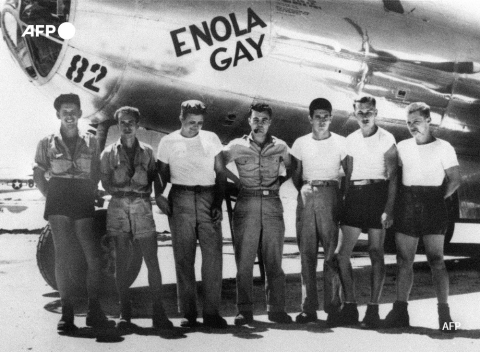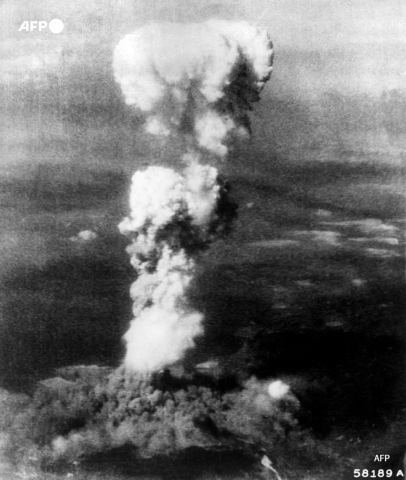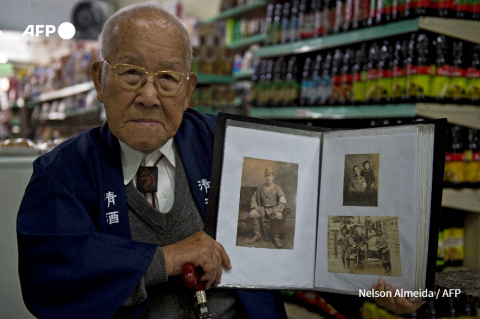'No regrets' for Hiroshima A-bomb crew

by Janet McEvoy
The 12-man crew of the bomber that made the first nuclear attack on Hiroshima in 1945 expressed little regret for their action.
"That's what it took to end the war," Lieutenant Colonel Paul Tibbets, the plane's commander and pilot, 30 at the time, told the Columbus Dispatch in 2003.
The August 6 bombing by a B-29 Superfortress, dubbed "Enola Gay" in honour of Tibbets' mother, led to the end of World War II but at a horrific price : 140,000 had died by the end of December.
It was the first time in history that an atomic bomb was used in combat. The second was three days later at Nagasaki, where some 70,000 people were killed.
Japan announced its surrender on August 15, 1945 -- bringing the war to a close.
The "Enola Gay" crew said that by ending the war and avoiding a devastating US land invasion of Japan, many other lives were saved.
Captain Theodore Van Kirk, the navigator of the plane who was 24 years old at the time, recalled "a sense of relief" because he felt the devastating bombing would finally end the war.
- Bomb 'saved lives' -
"I honestly believe the use of the atomic bomb saved lives in the long run. There were a lot of lives saved. Most of the lives saved were Japanese," Van Kirk said.
Radar specialist Lieutenant Jacob Beser, who flew on both the Hiroshima and Nagasaki bombings, agreed in a 1985 interview with the Washington Post.
"I have no regrets, no remorse about it," he said.

"If you take the highest figure of casualties in both cities, say 300,000 combined casualties in Hiroshima, Nagasaki versus a million, I'm sorry to say it's a good trade-off," he said. "It's a very cold way to look at it, but it's the only way to look at it."
"No remorse, no bad dreams," added tail gunner Bob Caron in an interview with the Rocky Mountain News two weeks before he died in 1995. "We accomplished our mission."
Tibbets didn't tell the crew they were going to drop an atomic bomb until well into the mission.
And while members did not regret the role they played, several hoped such a thing would never happen again.
"I'm convinced that the bombing saved many lives by ending the war," Major Thomas Ferebee, who pushed the button that dropped the bomb told Newsweek magazine in 1970.
"Then I think we should realise that this can't happen again," he told the Charlotte Observer in 1995.
"I pray no man will have to witness that sight again. Such a terrible waste, such a loss of life," Van Kirk said in 2005.
"We unleashed the first atomic bomb and I hope there will never be another. I pray that we have learned a lesson for all time. But I'm not sure we have."
- My God, what have we done? -
Crew members have graphic memories of the carnage in Hiroshima after the 15-kiloton bomb, dubbed "Little Boy", exploded 600 metres (2,000 feet) above the ground.
Radar operator Sergeant Joseph Stiborik remembered the crew sitting in stunned silence on the return flight.
"I was dumbfounded," he said. "Remember, nobody had seen what an A-bomb could do before. Here was a whole damn town nearly as big as Dallas, one minute all in good shape and the next minute disappeared and covered with fires and smoke."
"As the bomb fell over Hiroshima and exploded, we saw an entire city disappear. I wrote in my log the words: 'My God, what have we done?'," Captain Robert Lewis, the co-pilot, said.

After President Harry Truman gave his approval to drop the bomb, Tibbets and his crew lifted off from the Pacific island of Tinian in the early morning for a six-and-a-half hour flight to Japan. They dropped the bomb at 8:15 am plus 15 seconds local time.
After Tibbets' death in 2007 aged 92, Japanese survivors voiced regret that he never apologised.
"He did not apologise, arguing, like the American government, that the bombing saved millions of American and Japanese lives by ending the war," survivor Nori Tohei said.
"I wanted him to visit Hiroshima and take a direct look at what he did as a human being," said Tohei, who died in 2011 at the age of 82.
